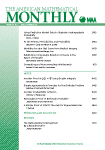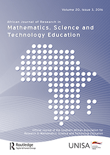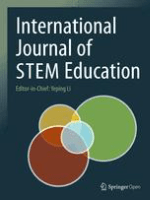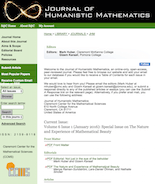
Mathematics Enthusiast
Scope & Guideline
Connecting researchers and educators in the realm of math.
Introduction
Aims and Scopes
- Integration of Historical Contexts in Mathematics Education:
The journal emphasizes the use of historical sources and contexts to enrich mathematics teaching, showcasing how primary sources can foster deeper understanding of mathematical concepts. - Development of Pedagogical Strategies:
Research on effective teaching strategies, including collaborative learning, multiple representations, and active learning, is a core area of focus, aimed at improving instructional practices. - Exploration of Representation Systems:
A consistent theme involves the study of how students use various mathematical representations (graphical, symbolic, verbal) to understand and communicate mathematical ideas. - Emphasis on Inclusivity and Diversity:
The journal advocates for inclusive pedagogies that address diverse learning needs and cultural backgrounds, seeking to make mathematics accessible to all students. - Focus on Teacher Development:
Research aimed at enhancing the skills and knowledge of mathematics educators, including preservice and inservice training, is a significant aspect of the journal's contributions.
Trending and Emerging
- Use of Technology in Mathematics Education:
There is a rising trend in exploring the integration of technology, such as GeoGebra and augmented reality, into mathematics teaching to enhance learning experiences. - Research on Student Agency and Identity in Mathematics:
Emerging studies focus on how students perceive their identity and agency in mathematics, emphasizing the importance of fostering confidence and ownership of learning. - Collaborative Learning and Team Teaching:
An increasing number of papers discuss the benefits of collaborative teaching approaches and team-based learning experiences in mathematics classrooms. - Culturally Relevant Pedagogy:
There is a growing emphasis on culturally responsive teaching practices that reflect students’ backgrounds and experiences, aiming to make mathematics more relatable. - Mathematical Modelling and Real-World Applications:
Research focusing on mathematical modeling as a tool for solving real-world problems is gaining prominence, underscoring the practical relevance of mathematics education.
Declining or Waning
- Traditional Methods of Teaching Mathematics:
There appears to be a waning interest in conventional teaching methods, as the journal increasingly prioritizes innovative and research-based pedagogical approaches. - Purely Theoretical Mathematical Research:
Research focusing solely on theoretical aspects of mathematics, without practical application in education, has decreased, reflecting a shift towards more applied mathematics education. - Statistics Education in Isolation:
While statistics remains important, there is a decline in papers dedicated solely to statistics education without integration into broader mathematical contexts or real-world applications. - Single-Domain Focus Studies:
Research that examines mathematics education within a singular domain or context is less prevalent, as the journal favors interdisciplinary studies that connect mathematics to other fields.
Similar Journals

AMERICAN MATHEMATICAL MONTHLY
Illuminating the World of Mathematics MonthlyAMERICAN MATHEMATICAL MONTHLY, published by Taylor & Francis Inc, is a prominent journal in the field of mathematics, recognized for its contribution to the dissemination of mathematical knowledge and pedagogy. With its ISSN 0002-9890 and E-ISSN 1930-0972, this journal has been a cornerstone for mathematicians since its inception, continuing to provide scholarly articles, educational materials, and insights into contemporary mathematical research. Although it follows a subscription model without Open Access options, its Q2 ranking in the Mathematics (miscellaneous) category reflects its reputable standing among peers, emphasized by its Scopus rank in the 22nd percentile. Based in the United States at 530 Walnut Street, Ste 850, Philadelphia, PA 19106, the journal spans topics that cater to both advanced researchers and aspiring students, facilitating an engaging dialogue within the mathematical community.

STUDIA MATHEMATICA
Championing Rigorous Research in MathematicsSTUDIA MATHEMATICA is a distinguished journal published by the Polish Academy of Sciences Institute of Mathematics - IMPAN, dedicated to advancing the field of mathematics since its inception. With an ISSN of 0039-3223 and an E-ISSN of 1730-6337, this journal serves as a significant forum for mathematicians worldwide to disseminate innovative research and theoretical advancements. Operating under a stringent peer-review process, STUDIA MATHEMATICA boasts a commendable impact factor that places it in the Q2 category within the mathematics discipline, indicating its critical role in the academic community. Covering a broad spectrum of mathematical topics, the journal aims to encourage interdisciplinary collaboration and foster a deeper understanding of both applied and theoretical aspects of mathematics. Researchers, professionals, and students alike will find a wealth of knowledge in its pages, contributing to the development of the mathematics field from its base in Warsaw, Poland. As it converges various strands of mathematical thought from 1996 to 2024, STUDIA MATHEMATICA continues to uphold its reputation as an essential resource for contemporary mathematical scholarship.

African Journal of Research in Mathematics Science and Technology Education
Pioneering Excellence in Mathematics and Science EducationAfrican Journal of Research in Mathematics Science and Technology Education is a distinguished academic journal, published by Routledge Journals, Taylor & Francis Ltd, dedicated to advancing knowledge in the fields of mathematics, science, and technology education within the African context. With an ISSN of 1811-7295 and an E-ISSN of 2469-7656, this journal has been a crucial platform for scholarly discourse since its inception in 1997, steadily gaining reputation and impact among researchers, educators, and policymakers. The journal features a rigorous peer-review process, ensuring that high-quality research garners visibility across various disciplines, as evidenced by its Quartile rankings in Computer Science Applications, Education, Engineering, Mathematics, and Physics and Astronomy. With its commitment to serving the educational community and fostering innovative practices, the African Journal of Research in Mathematics Science and Technology Education plays a pivotal role in shaping the future of STEM education in Africa and beyond.

International Journal of Education in Mathematics Science and Technology
Transforming educational outcomes through impactful research and practice.The International Journal of Education in Mathematics Science and Technology (ISSN: 2147-611X, E-ISSN: 2147-611X) is an esteemed publication dedicated to advancing knowledge and research in the fields of mathematics, science, and technology education. Published by Necmettin Erbakan University in Turkey, this journal serves as a vital platform for educators, researchers, and professionals to disseminate innovative methodologies, pedagogical strategies, and educational technologies. With a commendable Q2 ranking in both the Education and Mathematics categories for the year 2022, it clearly exemplifies its impact in these domains, boasting a Scopus rank of #19 out of 74 in Mathematics (miscellaneous) and a position in the 75th percentile. Although the journal has transitioned into open access, it remains committed to fostering a rich dialogue among scholars and practitioners dedicated to enhancing educational outcomes in mathematics and science. Researchers and educators interested in contributing to pedagogical advancements are encouraged to submit their work, thereby playing a part in influencing the future of education.

REDIMAT-Revista de Investigacion en Didactica de las Matematicas
Advancing the Frontiers of Mathematics EducationREDIMAT-Revista de Investigacion en Didactica de las Matematicas, published by HIPATIA PRESS, is a leading open-access journal dedicated to advancing research in mathematics education, particularly focusing on didactic methodologies and pedagogical innovations. Since its inception in 2012, the journal has fostered an inclusive platform for academics, educators, and practitioners to disseminate their findings and insights, significantly contributing to the field of mathematics education. With an ISSN of 2014-3621, REDIMAT aims to promote high-quality research and collaboration across diverse educational contexts. The journal not only emphasizes empirical studies but also theoretical developments and practical applications that enhance teaching and learning of mathematics worldwide. By providing a valuable resource for researchers, professionals, and students alike, REDIMAT plays a pivotal role in shaping the future of mathematics education research.

International Journal for Technology in Mathematics Education
Bridging the gap between technology and teaching.International Journal for Technology in Mathematics Education (ISSN: 1744-2710, E-ISSN: 2045-2519) is a pioneering platform published by Research Information Ltd that focuses on the interplay between technology and mathematics education. Established to bridge the gap between pedagogical practices and technological advancements, this journal connects researchers, educators, and practitioners in a bid to enhance teaching methodologies and optimize learning outcomes in mathematics. Although its coverage in Scopus was discontinued after 2020, it continues to be a vital resource for those interested in the integration of technology into educational settings. With its significant emphasis on interdisciplinary approaches, the journal has garnered attention in the realms of social sciences and computer science, with Scopus rankings reflecting its niche contributions. This journal is crucial for professionals aiming to explore innovative techniques in mathematics education, making it an invaluable addition to any academic library.

Avances de Investigacion en Educacion Matematica
Fostering Collaboration for a Brighter Mathematical Future.Avances de Investigacion en Educacion Matematica, published by the SOC ESPANOLA INVESTIGACION & EDUCACION MATEMATICA-SEIM, is a prominent open-access journal dedicated to advancing research and education in the field of mathematics. Since its inception in 2018, this journal has provided a platform for scholars to disseminate innovative findings and pedagogical strategies that enrich mathematical understanding and enhance educational practices. With an impact factor that places it in the Q2 quartile for both Education and Mathematics (Miscellaneous) categories, the journal ranks 179th among General Mathematics publications and 936th in Education, indicating a growing influence within the academic community. Based in Spain, Avances de Investigacion en Educacion Matematica is committed to fostering collaboration and extensive discourse among researchers and educators alike, empowering them to address contemporary challenges in mathematics education. As an open-access journal since 2022, it offers both researchers and practitioners unrestricted access to valuable resources and articles, ensuring that cutting-edge research is widely available to those who shape the future of mathematics education.

International Journal of STEM Education
Empowering Innovators through Open Access ResearchThe International Journal of STEM Education, published by Springer, is a leading open-access journal dedicated to advancing the field of STEM (Science, Technology, Engineering, and Mathematics) education. With its ISSN 2196-7822 and e-ISSN 2196-7822, the journal has established a significant presence in its domain since its launch in 2014, operating with an increased depth of scholarship through 2024. Hailing from Switzerland and addressing a global audience, the journal has achieved a remarkable ranking of Q1 in Education for 2023, placing it in the top tier of its field. The journal is ranked 26th out of 1543 in Social Sciences - Education according to Scopus metrics, highlighting its influence in shaping contemporary educational practices. By offering a platform for high-quality research articles, reviews, and case studies, the International Journal of STEM Education aims to promote effective teaching methodologies and innovation in STEM pedagogy, catering to researchers, educators, and policy makers alike. The commitment to open access ensures that the knowledge generated is readily available, fostering collaboration and dissemination of cutting-edge developments in STEM education.

Revista Latinoamericana de Investigacion en Matematica Educativa-RELIME
Transforming Challenges into Opportunities in Math LearningRevista Latinoamericana de Investigacion en Matematica Educativa (RELIME) is a pivotal open access journal dedicated to advancing research in mathematics education across Latin America. Published by the Comité Latinoamericano de Matemática Educativa (CLAME) since 1997, this journal aims to provide a platform for innovative research, theoretical discussions, and methodological advancements in the field. With an ISSN of 1665-2436 and E-ISSN of 2007-6819, RELIME contributes to the scholarly discourse on educational practices and policies, seeking to enhance the quality of mathematics education. Although currently ranked in the fourth quartile in Education by Scopus, with a social sciences education rank of #1153/1543 (25th percentile), the journal's Open Access policy ensures that research is widely available, thereby fostering collaboration among researchers, educators, and policymakers. Located in Mexico, the journal also emphasizes the unique challenges and successes within the Latin American educational context, inviting submissions that explore local, regional, and broader educational paradigms.

Journal of Humanistic Mathematics
Exploring the Beauty of Mathematics in Human ExperienceJournal of Humanistic Mathematics is a pioneering open-access journal published by the Claremont Center for Mathematical Sciences, dedicated to exploring the intersection of mathematics and the humanities. With an ISSN of 2159-8118 and operational since 2011, this journal fosters interdisciplinary dialogue among researchers, educators, and practitioners, emphasizing the role of mathematical thought in understanding human experience and culture. The journal aims to provide a platform for articles that not only advance mathematical scholarship but also illustrate the profound connections between mathematical concepts and broader humanistic themes. With its commitment to wide accessibility and a global readership, the Journal of Humanistic Mathematics stands as a vital resource for those interested in the philosophical and practical implications of mathematics in society.